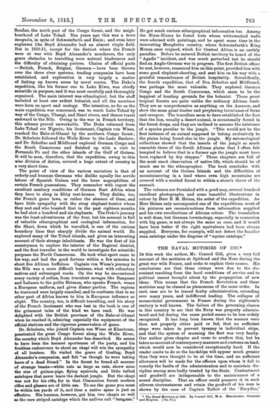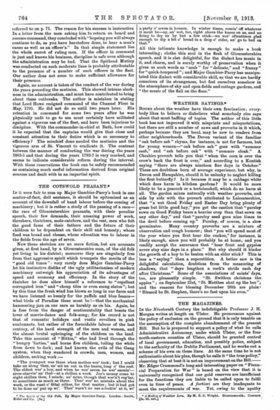THE NAVAL MUTINIES OF 1797.*
IN this work the author, Mr. Conrad Gill, gives a very full account of the mutinies at Spithead and the Nore during the great war with France, and seeks to explain their causes. His conclusions are that these risings were due to the discontent resulting from the hard conditions of service and to political unrest brought about by the propagation of new ideas. This means that the French Revolution and these mutinies may be classed as phenomena of the same order. In each case are to be traced faulty administration, extending over many years, and indifferent leading. The collapse of monarchical government in France during the eighteenth century is well known. The failure of the governing classes in this country to see that the Navy was properly administered and led during the same period seems to be less widely recognized. It has long been known that the seamen were then not properly either paid or fed, that no sufficient steps were taken to prevent tyranny in 'individual ships, and that the system of manning the fleet was very faulty. Our author gives chapter and verse to confirm this, but he takes no account of contemporary manners and customs on land, which would now be considered exceptionally hard. If the reader omits to do so the hardships will appear much greater than they were thought to be at the time, and no sufficient allowance will be made for the officers upon whom it fell to remedy the faults of the administration and to maintain discipline among men badly treated by the State. Contentment and goodwill are indispensable to the maintenance of a sound discipline. That an officer could preserve it in such adverse circumstances and retain the goodwill of his men is shown by the case of Captain Talbot of the Eurydice,'
referred to on p. 71. The reason for his success is instructive. In a letter from the men asking him to return on board and resume command, they concluded with "hopeing you will always continue to do, as you have heretofore done, to hear a man's cause as well as an officer's." In that simple statement lies the whole secret of ruling men. If the officer in command is just and knows his business, discipline is safe even although the administration may be bad. That the Spithead Mutiny was conducted on such moderate lines is probably attributable to the presence of a number of such officers in the fleet. Our author does not seem to make sufficient allowance for their presence.
Again, no account is taken of the conduct of the war during the years preceding the mutinies. This showed intense slackness in the administration, and must have contributed to bring about these outbreaks. The author is mistaken in stating that Lord Howe resigned command of the Channel Fleet in May, 1795. He did not do so until two years later. His retention in command for some two years after he was physically unfit to go to sea must certainly have militated against a vigorous use of the fleet, and have been injurious to discipline. With the commander-in-chief at Bath, how could it be expected that the captains would give that close and constant attention to their duties which is so necessary to efficiency ? The mischief done needed the mutinies and the vigorous arm of St. Vincent to eradicate it. The contrast between the manner of conducting the war during the years 1803-5 and that during the years 1793-7 is very marked, and seems to indicate considerable reform during the interval. With these reservations the book can be safely recommended as containing much useful information derived from original sources and dealt with in an impartial spirit.



















































 Previous page
Previous page